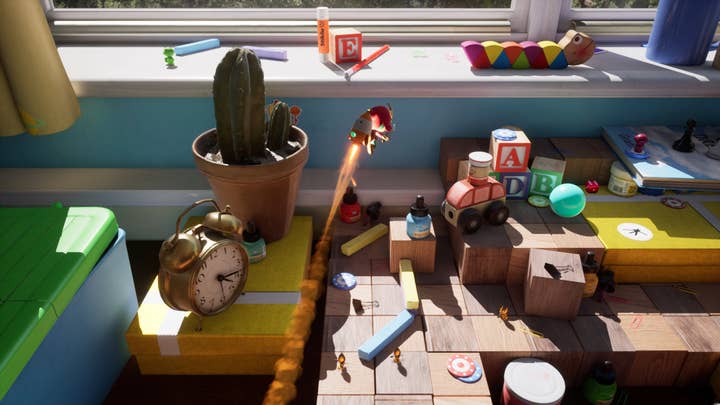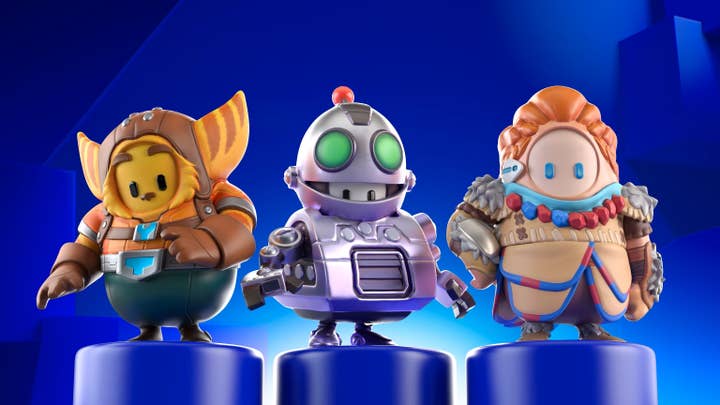Devolver co-founder says large-scale game dev "crushing under its own weight a little bit"
Nigel Lowrie discusses the publisher's continued focus on small-to-mid-sized games, and competing with live service titles for players' time
It's been a difficult stretch for the industry, so when we speak with Devolver Digital co-founder Nigel Lowrie at the Game Developers Conference, our first question is fairly open-ended: What is happening?
Lowrie mentions the well-established impact of the industry's pandemic boost receding, but believes there have been compounding factors impacting different aspects of the industry as well.
"There's us, on maybe the smaller-to-medium-size end. But on the larger end, it feels like it's crushing under its own weight a little bit," Lowrie said. "The consumers are so tied up in some of these really fantastic live service games, but there's only so much time they can spend. So there are more and more huge games being launched asking for an enormous amount of time, but there's just not that much time available for people to play."
"There are more and more huge games being launched asking for an enormous amount of time, but there's just not that much time available"
It's fairly common to talk about the indie space where Devolver operates and the AAA space as distinct markets where competition is less direct, but when the bottleneck is game players' time and not their money, we ask if that distinction becomes less relevant.
"That's what we've talked about a lot internally," Lowrie acknowledges, adding, "We avoid big games obviously because the momentum they'll have in the press and with influencers, but then you also have to think of the consumers.
"Helldivers is an excellent example. I play a lot of Helldivers with coworkers and friends. It's hard to pull people away from such a fantastic experience. You're really fighting for time. I don't care if you're a one-person, self-published studio or someone that has 1,000 people making a live service multigenerational game, you're still competing for that player's time. And you may have a very interesting game, but to pull them away from whatever for the two hours or 20 hours a week they have to play games, you have to make a pretty compelling case. I think we're all competing with each other."

While the audience has always had limited hours in the day for gaming, Lowrie said indie publishers are feeling that competition more acutely these days.
"There's a combination of more and more opportunities – I think it's great for developers to sign with a partner, whether it's an investor, a publisher, or to find someone to help them self-publish like a consultant. There are so many great opportunities, which just then breeds more [competition]. We want everyone to do well, but the fact remains it's competition for time and competition for getting in front of people. It's getting tougher and tougher to set yourself apart and make a clear argument as to why you should spend time with this game vs. that game, for sure."
One avenue that some indies found success with in recent years was launching into subscription services, where an upfront payment from the service would take enough of the risk out of a project make the possibility of undermining future sales less of a concern for developers.
But one trend Lowrie has noticed is that the deals to be included in those services are getting worse over time, even as the growth of offerings like Xbox Game Pass has tapered off.
"You have to convince people to put down money for your game rather than this service with 100 or 200 games to play. That does cause a little bit of a problem"
"A lot of it seems a little obtuse on how many people are actually [using them]," Lowrie says. "Every once in a while you hear how many subscribers these services have, so you don't really know. And you don't know how active they are. Are they part of a larger service? Some of these companies have multiple things outside of games and their subscription service also encompasses music or movies and things like that."
And while he concedes they can be a great deal for consumers who pay $10 or so a month for a library of quality games that they're never going to play all the way through with more being added from time to time, he doesn't think it's quite so appealing for people who still want to sell their games apart from such services.
"On the [developer's] side, then you have to convince people to put down money for your game rather than this service with 100 or 200 games to play," Lowrie says. "That does cause a little bit of a problem."
Devolver's solution for now is to put its games in subscription services only after they've been out for a certain length of time.
"We still really strongly believe in selling games first, because over the past 15 years, we know there's an audience to buy these games," Lowrie says. "And we're looking at subscription more for the longer tail, the people on the edge of things who were never really going to jump in at $40 or $30 or $20. But they're willing to try it, maybe buy something cosmetic or something like that? We're looking at it more as a long tail thing now, and my hope is that's where the industry is going."
That's just a preference though, as Lowrie specifies the company will consider other approaches.
"We're not ruling out day one subscription service," he says. "It depends on the kind of game it is and the audience you're going for, too. Most of our games we would prefer to sell the units first."
He notes that Devolver was the original publisher of Fall Guys, and the company did allow that in a subscription service at launch.
"One of the ideas there was that game needs a lot of people to play it right off the bat, so we did a deal with PlayStation and brought it to PlayStation Plus day one," Lowrie says. "So that makes a lot of sense to us. It is a balance, but it depends on the game. "

Having heard some indies at GDC talking about skipping Xbox and PlayStation because there just isn't much of an audience for indies on those platforms if you can't get included in their subscription services, we ask Lowrie about how healthy the console ecosystems are for indies these days.
He echoes the indies we heard from in acknowledging that Switch stands apart from Xbox and PlayStation on this front.
"They've created an ecosystem – and therefore a user base – that is really open to interesting concepts and gameplay ideas," Lowrie says of Nintendo. "The PlayStation and Xbox user, for as long as I've been doing this… there's a lot of people that still like indie games, don't get me wrong. Cult of the Lamb has done very well on those platforms. But I think the large majority of those people buy those platforms to show off what they can really do. They're looking at Destiny. They're looking at Helldivers. They're looking at Starfield. They definitely push those.
"There's still a smaller portion [of consumers] than we would like on Xbox and PlayStation that are open to looking at a pixel art platformer and going, 'I'll give this a shot'"
"I think the platforms themselves all are really strong believers in indie games. They really do push them. I think on the other end, the consumers – as big as they might be – there's still a smaller portion than we would like on Xbox and PlayStation that are open to looking at a pixel art platformer and going, 'I'll give this a shot.'"
Discoverability is always an issue for indie developers, and we ask if the prevalence of paid-for advertising spots on the Xbox and PlayStation Stores might make it harder for indies to succeed on those platforms. Lowrie says that's not really the case for Devolver.
"We have a relationship with those people, so we work with them, they know it's coming, and we are oftentimes given – because of the quality of the game and we sit down and explain it to them – we'll get some space on there next to those ads," he says. "We've paid for ads maybe once or twice…
"I think who's probably struggling the most is the smaller developer by themselves, who doesn't have a direct relationship with those folks to sit down with them and show the game and constantly update them on the game prior to launch so when it comes out, the store team's excited to put it on one of those available slots. That's a struggle. That's where you look at someone like Steam where they keep their hands off, and it rewards what floats to the top."
He points to the surprise success of rogue-like card game Balatro.
"You can have these things surprise and take over and be really top sellers, where that's less possible at the outset on the console side of things because there's limited space and the stores aren't set up to help discoverability as much," Lowrie says. "I do think they have made a lot of strides though."
Finally, we ask about Devolver's decision to go public in November of 2021 and ask how that's changed the way the company operates, especially given the share price is significantly down from its highs of around two years ago.
Lowrie says day-to-day, the changes haven't been that significant, particularly when it comes to the types of games Devolver is looking to put out.
"I'm pretty proud of the fact that we've kept our culture intact," he adds. "The motivations of what makes us happy, share price isn't number one. It's making sure our developers are happy and that we're putting out quality games. And things like share price and revenue or whatever follows, as long as we continue on the path we're on."

